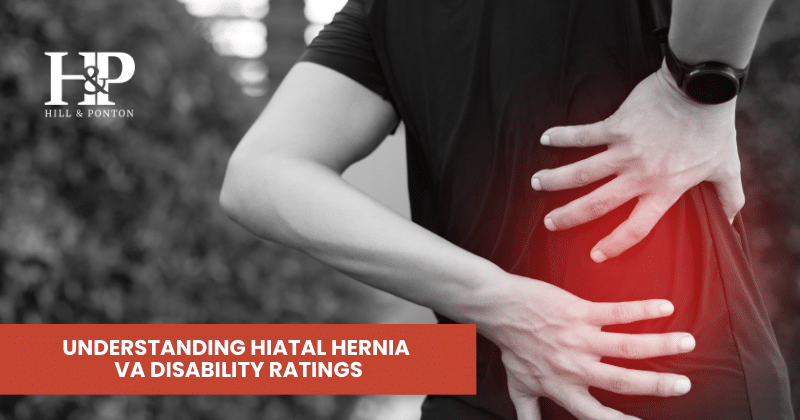Hiatal hernias are rated under the 38 CFR § 4.114, Schedule of Ratings – Digestive System, diagnostic code 7346. Veterans can be rated at 10, 30, or 60 percent, depending on the severity of their disability. The criteria for each VA rating are as follows:
- 60 percent – “Symptoms of pain, vomiting, material weight loss and hematemesis or melena with moderate anemia; or other symptom combinations productive of severe impairment of health.”
- 30 percent – “Persistently recurrent epigastric distress with dysphagia, pyrosis, and regurgitation, accompanied by substernal or arm or shoulder pain, productive of considerable impairment of health.”
- 10 percent – “With two or more of the symptoms for the 30 percent evaluation of less severity.”
What is a hiatal hernia and how do I know if I have one?
A hiatal hernia is a medical condition that occurs when a portion of the stomach protrudes into the chest through the hiatus, a small opening in the diaphragm.
The diaphragm is a muscle that separates the chest cavity from the abdominal cavity and aids in breathing.
Hiatal hernias are quite common, with an estimated 60% of people over the age of 50 experiencing one.
Types of Hiatal Hernias
There are two types of hiatal hernias: sliding and paraesophageal.
- Sliding Hiatal Hernia: the most common and occurs when the stomach and the junction between the esophagus and stomach slide up into the chest.
- Paraesophageal Hiatal Hernia: occurs when a portion of the stomach protrudes through the hiatus and remains there, causing a risk of complications such as strangulation and obstruction.
Symptoms of Hiatal Hernias
There are a variety of symptoms of hiatal hernias, including many of the following:
- Heartburn or acid reflux
- Chest pain or discomfort
- Difficulty swallowing (dysphagia)
- Belching or burping
- Nausea or vomiting
- Regurgitation of food or liquids
- Feeling of fullness or pressure in the chest or upper abdomen
- Shortness of breath or difficulty breathing
- Hoarseness or sore throat
- Chronic coughing
- Hiccups
- Fatigue or weakness
- Anemia (low red blood cell count) due to bleeding from the stomach lining being irritated by stomach acid.
- Bloating and abdominal pain.
Remember, some people may not experience any of these symptoms, while others may experience a combination of symptoms.
If you suspect you have a hiatal hernia, it’s important to see a doctor for a proper diagnosis and treatment.
Diagnosing Hiatal Hernias
Hiatal hernias are typically diagnosed through a variety of different tests and procedures. Some of these may include:
- Physical exam: The doctor may perform a physical exam and ask about your symptoms to assess whether you may have a hiatal hernia.
- Imaging tests: Imaging tests such as a chest X-ray, CT scan, or MRI can help identify a hiatal hernia by revealing the position of the stomach and the diaphragm.
- Endoscopy: An endoscope is a thin, flexible tube with a camera attached to it. During an endoscopy, the doctor inserts the tube through your mouth and down your esophagus to examine the lining of your stomach and esophagus. This procedure can help detect the presence of a hiatal hernia as well as other conditions such as inflammation or ulcers.
- Barium swallow: A barium swallow is a type of X-ray that involves swallowing a chalky liquid called barium. The barium coats the esophagus and stomach, making them visible on an X-ray. This test can help detect abnormalities such as a hiatal hernia or reflux.
Once a hiatal hernia has been diagnosed, the doctor will recommend a treatment plan based on the severity of the symptoms and any associated complications.
Treatment options may include lifestyle changes, medications, or surgery.
How do I get service-connected for a hiatal hernia?
In order to get disability benefits through the U.S. Department of Veterans Affairs (VA), veterans need to do three things:
- Prove an in-service event, injury or illness
- Have a current diagnosis by a medical professional
- Establish a medical nexus (link) between the in-service event, injury or illness and the current diagnosis
To get service-connected for a hiatal hernia, you will need to demonstrate that the condition is related to your military service.
This can be done by providing medical evidence such as:
- Diagnosis
- Treatment
- Any related medical records
You will also need to show a connection between your military service and the development of the hiatal hernia. This can be achieved by:
- providing statements from witnesses
- medical personnel statements or letters
- other documentation that shows a link between your service and the development of the condition
To apply for service-connected disability benefits, you will need to file a claim with the Department of Veterans Affairs (VA) by filling out VA Form 21-52EZ.
The VA will review your medical records, service records, and any other supporting evidence to determine if your condition is service-connected.
If your claim is approved, you may be eligible for disability compensation and other benefits.
GERD Secondary to Hiatal Hernias
GERD (Gastroesophageal Reflux Disease) is a common condition where the stomach acid and digestive enzymes flow back up into the esophagus, causing irritation and inflammation of the lining of the esophagus.
A hiatal hernia occurs when part of the stomach protrudes upward through the diaphragm into the chest cavity.
GERD is a common complication of hiatal hernias. The stomach protruding through the diaphragm leads to weakening of the lower esophageal sphincter, a muscular ring that separates the stomach from the esophagus.
This weakened lower esophageal sphincter allows the stomach’s acid and digestive enzymes to move back up into the esophagus, leading to GERD.
The symptoms of GERD secondary to hiatal hernia are similar to those of GERD and include:
- heartburn
- acid reflux
- chest pain
- difficulty swallowing
- regurgitation
- nausea
If left untreated, GERD can cause complications such as esophagitis, Barrett’s esophagus, and esophageal cancer.
Treatment for GERD secondary to hiatal hernia may include:
- lifestyle modifications such as losing weight, avoiding trigger foods, and raising the head of the bed
- medications such as proton pump inhibitors (PPIs), H2 blockers, and antacids can help reduce the amount of stomach acid and relieve symptoms
- surgery may be necessary in severe cases where medication and lifestyle changes are ineffective
If you suspect you have GERD secondary to hiatal hernia, it’s important to see a doctor for proper diagnosis and treatment.
What to expect at a C&P Exam for a Hiatal Hernia?
A Compensation and Pension (C&P) examination is a medical evaluation performed by the Department of Veterans Affairs (VA) to determine the extent of a veteran’s disability and to assign a disability rating.
Veterans who are seeking disability compensation for a hiatal hernia may be scheduled for a C&P examination.
During the examination, a VA examiner will perform a physical examination to assess the severity of the hiatal hernia and any related symptoms.
The examiner will ask the veteran about their medical history, including any past surgeries or treatments for the condition.
The examiner may also review medical records and imaging studies such as X-rays or CT scans.
The examiner will assess the impact of the hiatal hernia on the veteran’s ability to perform daily activities and work.
The examiner will also look for any evidence of complications such as GERD, bleeding, or anemia.
After the examination, the VA examiner will prepare a report detailing their findings and conclusions.
The report will be used to determine the veteran’s eligibility for disability compensation and to assign a disability rating based on the severity of the condition and its impact on the veteran’s ability to function.
It’s important for veterans to provide as much information as possible about their hiatal hernia and related symptoms during the C&P examination.
This will ensure that the examiner has a complete understanding of the veteran’s condition and can provide an accurate assessment.
Veterans should also bring any relevant medical records or imaging studies to the examination to help support their claim.
Have Questions About Appealing Your Claim or Understanding How the Claims Process Works?
The attorneys at Hill & Ponton are here to support you with appealing a claim to get benefits due to a hiatal hernia.
If you are intending to appeal a denied claim, you can contact us for an evaluation and we can help you with this process.
However, if you are considering filing an initial claim, or even if you are interested in learning about the appeals process, we offer a free ebook to get you started on the right foot!
The Road to VA Compensation Benefits will help break down the claims process from start to finish. Click the link below to learn more.





